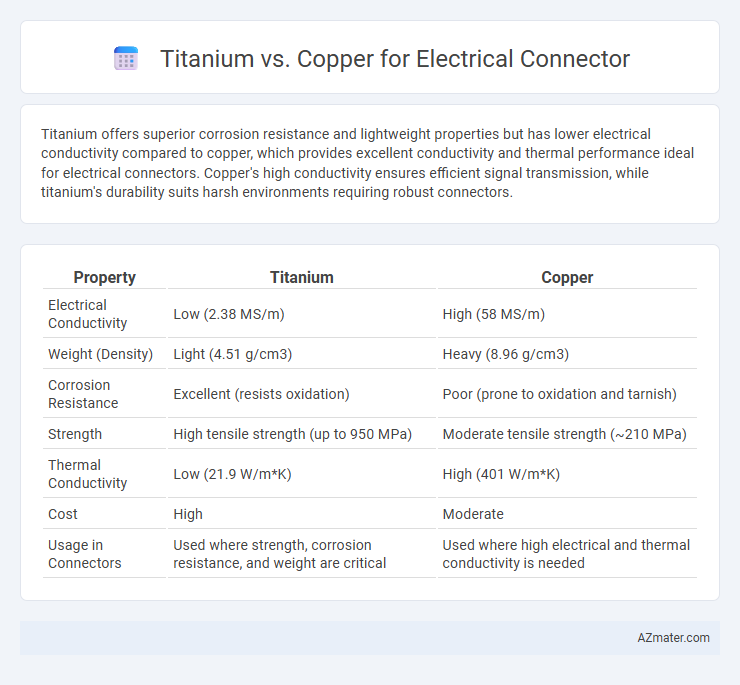Titanium offers superior corrosion resistance and lightweight properties but has lower electrical conductivity compared to copper, which provides excellent conductivity and thermal performance ideal for electrical connectors. Copper's high conductivity ensures efficient signal transmission, while titanium's durability suits harsh environments requiring robust connectors.
Table of Comparison
| Property | Titanium | Copper |
|---|---|---|
| Electrical Conductivity | Low (2.38 MS/m) | High (58 MS/m) |
| Weight (Density) | Light (4.51 g/cm3) | Heavy (8.96 g/cm3) |
| Corrosion Resistance | Excellent (resists oxidation) | Poor (prone to oxidation and tarnish) |
| Strength | High tensile strength (up to 950 MPa) | Moderate tensile strength (~210 MPa) |
| Thermal Conductivity | Low (21.9 W/m*K) | High (401 W/m*K) |
| Cost | High | Moderate |
| Usage in Connectors | Used where strength, corrosion resistance, and weight are critical | Used where high electrical and thermal conductivity is needed |
Introduction: Titanium vs Copper in Electrical Connectors
Titanium and copper are critical materials in electrical connectors, each offering distinct advantages tailored to specific applications. Copper boasts superior electrical conductivity at approximately 5.96 x 10^7 S/m, making it the standard choice for efficient current flow and minimizing energy loss. Titanium provides exceptional corrosion resistance and mechanical strength, beneficial in harsh environments despite its significantly lower conductivity of around 2.38 x 10^6 S/m, positioning it as a specialized option where durability outweighs conductivity.
Material Properties Overview
Titanium offers exceptional corrosion resistance, high strength-to-weight ratio, and excellent fatigue resistance, making it ideal for lightweight electrical connectors in harsh environments. Copper provides superior electrical and thermal conductivity, ensuring efficient current flow and minimal energy loss in electrical connectors. The choice between titanium and copper depends on the balance between mechanical durability and conductivity requirements for specific connector applications.
Conductivity Comparison
Copper offers significantly higher electrical conductivity, approximately 58 MS/m (megasiemens per meter), making it the preferred choice for electrical connectors where efficient current flow is critical. Titanium has much lower conductivity, roughly 2.4 MS/m, which limits its use to specialized applications requiring corrosion resistance or strength rather than optimal electrical performance. The conductivity difference directly affects connector efficiency, heat generation, and power loss, with copper connectors ensuring superior performance in most electrical systems.
Corrosion Resistance and Durability
Titanium offers superior corrosion resistance compared to copper, making it ideal for connectors exposed to harsh or marine environments where oxidation and metal degradation are major concerns. Copper's excellent electrical conductivity is paired with moderate corrosion resistance, which often necessitates protective coatings or alloys to enhance durability in corrosive conditions. Titanium connectors deliver longer-lasting performance due to their strength and resistance to wear, corrosion, and galvanic degradation, making them preferable for applications demanding high durability alongside electrical functionality.
Weight and Mechanical Strength
Titanium offers a significant advantage over copper in electrical connectors due to its high strength-to-weight ratio, being about 60% lighter while providing superior mechanical strength and corrosion resistance. Copper, although heavier and less strong mechanically, excels in electrical conductivity, making it ideal for applications where conductivity outweighs weight concerns. For weight-sensitive projects requiring durable connectors, titanium stands out as the preferred material for balancing mechanical robustness and reduced mass.
Thermal Performance
Titanium offers superior corrosion resistance but has lower thermal conductivity, approximately 21.9 W/m*K, compared to copper's 401 W/m*K, making copper significantly more efficient for heat dissipation in electrical connectors. Copper's high thermal conductivity ensures minimal thermal resistance and better performance under high-current applications, reducing the risk of overheating and energy loss. Titanium's lower thermal performance limits its use primarily to environments demanding strength and corrosion resistance rather than optimal thermal management.
Cost Considerations
Titanium electrical connectors generally incur higher initial costs due to the metal's scarcity and complex manufacturing process compared to copper, which is widely available and easier to produce. Copper offers superior electrical conductivity, often reducing overall system costs by enhancing energy efficiency and minimizing resistive losses. When evaluating long-term expenses, titanium's corrosion resistance and durability might lower maintenance costs, but copper remains more cost-effective for most standard electrical applications.
Application Suitability
Titanium demonstrates superiority in electrical connectors for aerospace and medical applications due to its excellent corrosion resistance, lightweight properties, and strength-to-weight ratio, making it ideal for harsh environments with strict weight constraints. Copper remains the preferred material in high-conductivity electrical applications such as power distribution, telecommunications, and automotive industries due to its exceptional electrical conductivity and cost-effectiveness. For applications requiring a balance between mechanical durability and electrical performance, titanium-copper alloys or coated connectors offer optimized solutions combining corrosion resistance and conductivity.
Environmental and Maintenance Factors
Titanium connectors offer superior corrosion resistance and longer lifespan in harsh environments compared to copper, reducing maintenance frequency and environmental impact due to less material replacement. Copper connectors provide excellent electrical conductivity but are prone to oxidation and require more frequent cleaning or replacement, leading to increased waste and environmental burden. Choosing titanium over copper enhances sustainability by minimizing resource consumption and lowering maintenance-related emissions in electrical systems.
Final Verdict: Choosing the Right Material
Titanium offers superior corrosion resistance and lightweight properties, making it ideal for harsh environments but has higher electrical resistance compared to copper. Copper provides excellent electrical conductivity and cost-effectiveness, ensuring optimal performance in most electrical connectors. For applications prioritizing conductivity and budget, copper remains the preferred choice, while titanium suits specialized, durable connectors exposed to extreme conditions.

Infographic: Titanium vs Copper for Electrical Connector
 azmater.com
azmater.com